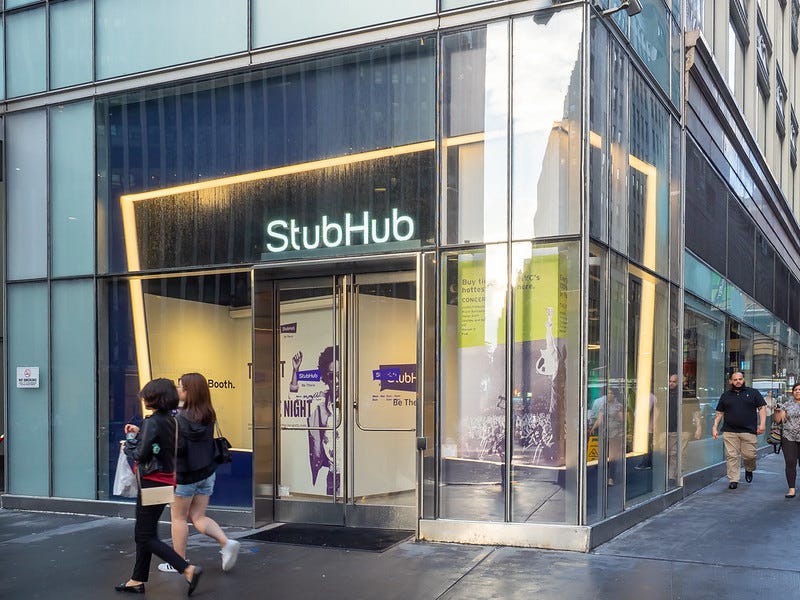Will live concerts come back before Viagogo and StubHub fall apart?
Eric Baker cofounded both companies. Can he save them?
StubHub and Viagogo are two marketplaces for buying and selling event tickets. Eric Baker cofounded StubHub and then later founded Viagogo. In a spectacular feat, he merged both companies in early 2020, only for COVID-19 to shut down the live events world a few weeks later.
Here is what he is up against.
The origin story
Jeff Fluhr and Eric Baker cofounded StubHub in March 2000 at the Stanford Graduate School of Business. Fluhr dropped out of school to build the team and product, but Baker didn’t immediately take the leap. Baker rejoined StubHub as President in 2001 as Fluhr served as CEO.
Fluhr and Baker began to clash with each over the following years. In 2004, StubHub’s Board sided with Fluhr and fired Baker.
At the start of 2007, StubHub under Fluhr’s leadership sold to eBay for $310 million in cash.

Eric Baker’s redemption
Baker had never signed a non-compete with StubHub, opening the door for him to beat StubHub to expanding in Europe. In 2006, Baker launched Viagogo in a flashy announcement with the soccer clubs Manchester United and Chelsea as partners.
In January 2019, the activist investment firm Elliot Management published a letter to eBay’s Board of Directors with recommendations for streamlining eBay—including by selling StubHub. This gave Baker the opening to buy back the company he was fired from. In November 2019, Viagogo announced their intent to buy StubHub from eBay for $4.05 billion in cash.
In mid-December, the UK Government Competition and Markets Authority (CMA) announced an inquiry into the proposed merger. On February 7, 2020, the CMA issued an enforcement order that would “lead to the integration of the StubHub business with the Viagogo business” until the CMA investigation has completed.
On February 13, 2020, Viagogo finalized the StubHub acquisition despite the CMA’s concerns—while committing to run both companies separately to comply with the enforcement order.
“The Worst Deal Ever”
Baker’s redemption was short-lived. By mid-March, COVID-19 lockdowns had cancelled live events all around the world, leaving Baker to face ticket-holders demanding refunds from both Viagogo and StubHub. Forbes Magazine mocked the merger in a piece titled “The Worst Deal Ever.”
To avoid a cash crunch, StubHub altered their refund policies to offer a coupon instead of cash—triggering four (consolidated) lawsuits in the United States plus a class action lawsuit in Canada. Another lawsuit was filed against Viagogo in Florida. Similar lawsuits have also been filed against competitors SeatGeek, Vivid Seats, and Ticketmaster.
Meanwhile, StubHub began to shed staff. They had already cut at least 93 jobs in January, and they cut 200 more jobs by the start of June. By the end of July, StubHub emailed employees that they were shutting down their Latin American and Asian Pacific offices.
And then in October 2020, regulators around the world hit Viagogo with bad news:
Australia. Viagogo was ordered to pay a $7 million AUD fine for “misleading consumers.”
Ireland. A proposed bill to criminalize reselling tickets above face value is gaining traction.
United Kingdom. The UK CMA raised concerns that Viagogo and StubHub combined would have 90% marketshare of the UK secondary ticket market and their merger could increase fees and lower the quality of service. Viagogo responded to the CMA by suggesting they divest StubHub’s operations outside of the United States and Canada.
Jeff Fluhr’s return?

At the same time, Jeff Fluhr—now a venture capitalist at Craft Ventures—wrote an open letter to the CMA suggesting that Viagogo should be forced to divest all of StubHub… preferably to a purchaser with experience in the events business.
In the letter, Fluhr reminisces over his deep experience as StubHub’s CEO from founding to the eBay acquisition—throwing his hat in the ring as a “potential purchaser of the entirety of StubHub from Viagogo.” He also alludes to the deep experience of his peers at Craft Ventures, although the letter is unclear whether he wants to purchase StubHub as an individual or on behalf of Craft.
If Fluhr’s bid to purchase StubHub were to succeed, this would be the second time he pushed Baker out of the company they cofounded.
The next two years
Viagogo recently raised $330 million in debt, and Moody’s Investor Service estimates that Viagogo now has two years of runway if the ticketing industry doesn’t rebound before then.
However, two years may not be enough time, for two reasons:
Depressed valuations. Viagogo’s $4.05 billion purchase price for StubHub was already more than 25x StubHub’s EBITDA—before COVID-19 lockdowns wiped out all revenue and created refund obligations. If the UK CMA forces Viagogo to divest StubHub, Viagogo would take an enormous loss on the purchase and wouldn’t benefit from StubHub’s post-recovery revenue growth.
The extra-long road to recovery. Typically tickets for an event are sold out on primary sellers like Ticketmaster before the supply and demand reaches secondary markets. This means that Viagogo and StubHub’s economic recovery only begins once primary sellers’ economic recovery is complete.
So what can Eric Baker do?
If he can raise more capital—whether via equity or debt—he should. Viagogo needs more money to guard against the possibilities of:
Weak consumer demand. Some amount of consumer spending may have permanently shifted to other forms of entertainment. It may not be possible to shift that demand back to live events.
Paying cash refunds. Regulators or courts may demand that cancelled tickets from 2020 need to be redeemed with cash refunds as opposed to coupons.
But even a giant infusion of capital won’t solve his problems with governments, which may cause:
Divestiture. The UK CMA might force Viagogo to sell (parts of) StubHub.
Slow vaccination. The longer it takes for the public to achieve herd immunity, the less cash Viagogo will have in the bank.
Continuing lockdown restrictions. Governments may be slow to ease restrictions on live events until statistics prove that herd immunity has been achieved.
Other regulatory restrictions. As mentioned above, Australia and the UK have taken steps to penalize ticket marketplaces for misleading practices. In the US, President Biden’s Federal Trade Commission may step up enforcement of existing legislation like the Better Online Ticket Sales (BOTS) Act which might indirectly curtail the supply of tickets available on marketplaces like Viagogo and StubHub.
Baker has a lot going against him right now. However, if he does manage a to simultaneously turn around both Viagogo and StubHub, it’ll catapult him into the near-mythological plane of turnaround founders like Steve Jobs and Jack Dorsey. Personally, I’m rooting for him.
Changelog
January 31, 2022: Minor formatting changes to support new Substack features.
February 13, 2022: Minor formatting changes.



